Hexagramme 26 du Yi Jing - Trait 2
L'hexagramme : 26
Un hexagramme est une combinaison de six traits yin et yang.

26.2 (26 > 22) - THE TÂ KHÛ HEXAGRAM.
The second line, undivided, shows a carriage with the strap under it removed.
Bing DeepL Google Yandex26.2 (26 > 22) - Being sidelined
One leaves because one is not being trusted.
Bing DeepL Google Yandex26.2 (26 > 22) - Being sidelined
One leaves because one is not being trusted.
Bing DeepL Google Yandex26.2 (26 > 22) - Tá tchu, le pouvoir contraignant de la grandeur
Tá tchu : 1. Grand entretien ; 2. Dompter, conduire
(Comme, par exemple, quand) un char a perdu le cuir qui le maintient en place (droit).
Bing DeepL Google Yandex26.2 (26 > 22) - Être mis sur la touche
On part car on ne nous fait pas confiance.
Bing DeepL Google YandexLes trigrammes
Les trigrammes sont des combinaisons de trois traits yin et yang. Dans l'hexagramme, les trois traits du dessous constituent le trigramme inférieur et représentent la situation intérieure. Les trois lignes du haut constituent le trigramme supérieur et représentent la situation extérieure.
trigSup

Trigramme inférieur : Le ciel Le feu


L'hexagramme nucléaire : 54.1 (54 > 40)
L'hexagramme nucléaire est l'association des deux trigrammes intérieurs (traits 2,3,4 et 3,4,5). Il représente la racine, ou l'origine de la situation.

54.1 (54 > 40) - THE KWEI MEI HEXAGRAM.
The first line, undivided, shows the younger sister married off in a position ancillary to the real wife. (It suggests the idea of) a person lame on one leg who yet manages to tramp along. Going forward will be fortunate.
Bing DeepL Google Yandex54.1 (54 > 40) - Kvêi Mei, la fille à marier
Kvêi-Mei : marier une jeune sœur, une jeune fille.
Marier une sœur cadette en la donnant comme femme secondaire (c’est la mettre dans la position d’un boiteux qui marche encore, mais mal). Ainsi cette jeune fille est épouse, mais dans une condition inférieure. Corriger cet abus sera chose excellente. [Cela se fait constamment.]
Bing DeepL Google Yandex54.1 (54 > 40) - Perdre patience
Les autres hésitent alors on va plus loin.
Bing DeepL Google YandexLe dérivé (Fan Yao) : 22.2
Le même trait sur l'hexagramme après la mutation. Il représente ce qui peut être fait APRÈS pour corriger la situation décrite par ce trait, un peu comme un remède ou une solution.
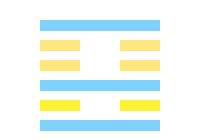
22.2 (22 > 26) - THE PÎ HEXAGRAM.
The second line, divided, shows one adorning his beard.
Bing DeepL Google Yandex22.2 (22 > 26) - Being accompanied
One goes with their entourage, which may be useful.
Bing DeepL Google Yandex22.2 (22 > 26) - Being accompanied
One goes with their entourage, which may be useful.
Bing DeepL Google Yandex22.2 (22 > 26) - Pî, la grâce
Pi : 1. Éclat, rayon, orner ; 2. Exercer, rendre fort.
(Autre exemple du mot.) Orner, arranger sa barbe, la mettre en ordre, la rendre belle et luisante. Image du bel arrangement, de la vertu.
Bing DeepL Google Yandex22.2 (22 > 26) - Se faire accompagner
On va avec son entourage, qui sera peut-être utile.
Bing DeepL Google YandexLa jointure: 21.5
Le dérivé du réciproque. Il représente ce qui aurait pu être fait AVANT pour prévenir la situation décrite par ce trait, un peu comme un remède ou une solution.

21.5 (21 > 25) - THE SHIH HO HEXAGRAM.
The fifth line, divided, shows one gnawing at dried flesh, and finding the yellow gold. Let him be firm and correct, realising the peril (of his position). There will be no error.
Bing DeepL Google Yandex21.5 (21 > 25) - Negotiating
One discusses to prepare an acceptable agreement.
Bing DeepL Google Yandex21.5 (21 > 25) - Negotiating
One discusses to prepare an acceptable agreement.
Bing DeepL Google Yandex21.5 (21 > 25) - Shih hok, mordre au travers
Shih hok : 1. Bavardage mordant, méchant ; 2. Hok : mordre, mâcher.
Il acquerra de l’or pur ; bien que son avancement se fasse au milieu des périls, il ne faiblira pas. Il obtiendra une récompense convenable.
Bing DeepL Google Yandex21.5 (21 > 25) - Döntés
Tárgyal, hogy előkészítsen egy elfogadható megállapodást.
Bing DeepL Google YandexLe réciproque : 25.5
L'hexagramme renversé. Il représente la situation opposée, et en tant que tel est essentiel pour la validation des commentaires.

25.5 (25 > 21) - THE WÛ WANG HEXAGRAM.
The fifth line, undivided, shows one who is free from insincerity, and yet has fallen ill. Let him not use medicine, and he will have occasion for joy (in his recovery).
Bing DeepL Google Yandex25.5 (25 > 21) - Reducing risks
One is diminished by voluntary constraints.
Bing DeepL Google Yandex25.5 (25 > 21) - Reducing risks
One is diminished by voluntary constraints.
Bing DeepL Google Yandex25.5 (25 > 21) - Wu wâng, l’innocence, l’imprévu
Wu wāng : sans blâme, irréprochable, honnête.
L’honnête homme malade n’a pas besoin de médecine pour être content. (Il l’est par le témoignage de sa conscience.)
Il ne doit pas en essayer.
25.5 (25 > 21) - Réduire les risques
On est diminué par des contraintes volontaires.
Bing DeepL Google YandexMutations

26.2 (26 > 22) - THE TÂ KHÛ HEXAGRAM.
The second line, undivided, shows a carriage with the strap under it removed.
Bing DeepL Google Yandex26.2 (26 > 22) - Being sidelined
One leaves because one is not being trusted.
Bing DeepL Google Yandex26.2 (26 > 22) - Being sidelined
One leaves because one is not being trusted.
Bing DeepL Google Yandex26.2 (26 > 22) - Tá tchu, le pouvoir contraignant de la grandeur
Tá tchu : 1. Grand entretien ; 2. Dompter, conduire
(Comme, par exemple, quand) un char a perdu le cuir qui le maintient en place (droit).
Bing DeepL Google Yandex26.2 (26 > 22) - Être mis sur la touche
On part car on ne nous fait pas confiance.
Bing DeepL Google Yandex
26.1.2 (26 > 52) - THE TÂ KHÛ HEXAGRAM.
- 1. The first line, undivided, shows its subject in a position of peril. It will be advantageous for him to stop his advance.
- 2. The second line, undivided, shows a carriage with the strap under it removed.
26.1.2 (26 > 52) - Respecting the losers
One congratulates one's opponents who have fought bravely.
Bing DeepL Google Yandex26.1.2 (26 > 52) - Respecting the losers
One congratulates one's opponents who have fought bravely.
Bing DeepL Google Yandex26.1.2 (26 > 52) - Tá tchu, le pouvoir contraignant de la grandeur
Tá tchu : 1. Grand entretien ; 2. Dompter, conduire
- 1. Quand il survient quelque danger, il est bon de s’arrêter (se vaincre), de céder aux circonstances et de ne point vouloir l’emporter de force.
- 2. (Comme, par exemple, quand) un char a perdu le cuir qui le maintient en place (droit).
26.1.2 (26 > 52) - Respecter les perdants
On félicite ses adversaires qui se sont battus avec courage.
Bing DeepL Google Yandex26.1.2 (26 > 52) - Ellenőrzés
- 1. Nem akar menni és azonnal megnézni mert nem olyan fontos.
- 2. Otthagyja mert nem bíznak benne.

26.2.3 (26 > 27) - THE TÂ KHÛ HEXAGRAM.
- 2. The second line, undivided, shows a carriage with the strap under it removed.
- 3. The third line, undivided, shows its subject urging his way with good horses. It will be advantageous for him to realise the difficulty (of his course), and to be firm and correct, exercising himself daily in his charioteering and methods of defence; then there will be advantage in whatever direction he may advance.
26.2.3 (26 > 27) - Tá tchu, le pouvoir contraignant de la grandeur
Tá tchu : 1. Grand entretien ; 2. Dompter, conduire
- 2. (Comme, par exemple, quand) un char a perdu le cuir qui le maintient en place (droit).
- 3. Celui qui chemine avec des chevaux bien entretenus, sortira heureusement des difficultés. S’il s’exerce chaque jour à conduire et combattre, tout réussira pour lui. (Suite de la bonne éducation.)
26.2.3 (26 > 27) - Avoir le nez dans le guidon
On épluche des légumes à longueur de journée.
Bing DeepL Google Yandex26.2.3 (26 > 27) - Ellenőrzés
- 2. Otthagyja mert nem bíznak benne.
- 3. Elkíséri.

26.1.2.3 (26 > 23) - THE TÂ KHÛ HEXAGRAM.
- 1. The first line, undivided, shows its subject in a position of peril. It will be advantageous for him to stop his advance.
- 2. The second line, undivided, shows a carriage with the strap under it removed.
- 3. The third line, undivided, shows its subject urging his way with good horses. It will be advantageous for him to realise the difficulty (of his course), and to be firm and correct, exercising himself daily in his charioteering and methods of defence; then there will be advantage in whatever direction he may advance.
26.1.2.3 (26 > 23) - Doing as before
One refuses to see other offers until being convinced that the first proposals are not viable.
Bing DeepL Google Yandex26.1.2.3 (26 > 23) - Doing as before
One refuses to see other offers until being convinced that the first proposals are not viable.
Bing DeepL Google Yandex26.1.2.3 (26 > 23) - Tá tchu, le pouvoir contraignant de la grandeur
Tá tchu : 1. Grand entretien ; 2. Dompter, conduire
- 1. Quand il survient quelque danger, il est bon de s’arrêter (se vaincre), de céder aux circonstances et de ne point vouloir l’emporter de force.
- 2. (Comme, par exemple, quand) un char a perdu le cuir qui le maintient en place (droit).
- 3. Celui qui chemine avec des chevaux bien entretenus, sortira heureusement des difficultés. S’il s’exerce chaque jour à conduire et combattre, tout réussira pour lui. (Suite de la bonne éducation.)
26.1.2.3 (26 > 23) - Faire comme avant
On refuse de voir d'autres offres avant d'avoir été convaincu de la non-viabilité des premières propositions.
Bing DeepL Google Yandex26.1.2.3 (26 > 23) - Ellenőrzés
- 1. Nem akar menni és azonnal megnézni mert nem olyan fontos.
- 2. Otthagyja mert nem bíznak benne.
- 3. Elkíséri.

26.2.4 (26 > 30) - THE TÂ KHÛ HEXAGRAM.
- 2. The second line, undivided, shows a carriage with the strap under it removed.
- 4. The fourth line, divided, shows the young bull, (and yet) having the piece of wood over his horns. There will be great good fortune.
26.2.4 (26 > 30) - Anticipating the end
One will know how to tell others what one wants.
Bing DeepL Google Yandex26.2.4 (26 > 30) - Anticipating the end
One will know how to tell others what one wants.
Bing DeepL Google Yandex26.2.4 (26 > 30) - Tá tchu, le pouvoir contraignant de la grandeur
Tá tchu : 1. Grand entretien ; 2. Dompter, conduire
- 2. (Comme, par exemple, quand) un char a perdu le cuir qui le maintient en place (droit).
- 4. Le joug, la planchette que porte le jeune boeuf est d’un usage très heureux pour le dompter et le former au labourage (second sens).
26.2.4 (26 > 30) - Prévoir la fin
On saura dire aux autres ce que l'on veut.
Bing DeepL Google Yandex26.2.4 (26 > 30) - Ellenőrzés
- 2. Otthagyja mert nem bíznak benne.
- 4. A másik erőszakosságának kezelése adakozással.

26.1.2.4 (26 > 56) - THE TÂ KHÛ HEXAGRAM.
- 1. The first line, undivided, shows its subject in a position of peril. It will be advantageous for him to stop his advance.
- 2. The second line, undivided, shows a carriage with the strap under it removed.
- 4. The fourth line, divided, shows the young bull, (and yet) having the piece of wood over his horns. There will be great good fortune.
26.1.2.4 (26 > 56) - Showing one's disappointment by pouting
One has caught a disease that is not listed in the records.
Bing DeepL Google Yandex26.1.2.4 (26 > 56) - Showing one's disappointment by pouting
One has caught a disease that is not listed in the records.
Bing DeepL Google Yandex26.1.2.4 (26 > 56) - Tá tchu, le pouvoir contraignant de la grandeur
Tá tchu : 1. Grand entretien ; 2. Dompter, conduire
- 1. Quand il survient quelque danger, il est bon de s’arrêter (se vaincre), de céder aux circonstances et de ne point vouloir l’emporter de force.
- 2. (Comme, par exemple, quand) un char a perdu le cuir qui le maintient en place (droit).
- 4. Le joug, la planchette que porte le jeune boeuf est d’un usage très heureux pour le dompter et le former au labourage (second sens).
26.1.2.4 (26 > 56) - Montrer sa déception en faisant la moue
On a attrapé une maladie qui n'est pas répertoriée dans les annales.
Bing DeepL Google Yandex26.1.2.4 (26 > 56) - Ellenőrzés
- 1. Nem akar menni és azonnal megnézni mert nem olyan fontos.
- 2. Otthagyja mert nem bíznak benne.
- 4. A másik erőszakosságának kezelése adakozással.

26.2.3.4 (26 > 21) - THE TÂ KHÛ HEXAGRAM.
- 2. The second line, undivided, shows a carriage with the strap under it removed.
- 3. The third line, undivided, shows its subject urging his way with good horses. It will be advantageous for him to realise the difficulty (of his course), and to be firm and correct, exercising himself daily in his charioteering and methods of defence; then there will be advantage in whatever direction he may advance.
- 4. The fourth line, divided, shows the young bull, (and yet) having the piece of wood over his horns. There will be great good fortune.
26.2.3.4 (26 > 21) - Running out of time
One regrets lacking of time to do what one would have liked.
Bing DeepL Google Yandex26.2.3.4 (26 > 21) - Running out of time
One regrets lacking of time to do what one would have liked.
Bing DeepL Google Yandex26.2.3.4 (26 > 21) - Tá tchu, le pouvoir contraignant de la grandeur
Tá tchu : 1. Grand entretien ; 2. Dompter, conduire
- 2. (Comme, par exemple, quand) un char a perdu le cuir qui le maintient en place (droit).
- 3. Celui qui chemine avec des chevaux bien entretenus, sortira heureusement des difficultés. S’il s’exerce chaque jour à conduire et combattre, tout réussira pour lui. (Suite de la bonne éducation.)
- 4. Le joug, la planchette que porte le jeune boeuf est d’un usage très heureux pour le dompter et le former au labourage (second sens).
26.2.3.4 (26 > 21) - Manquer de temps
On regrette de ne pas avoir eu le temps de faire ce qu'on aurait voulu.
Bing DeepL Google Yandex26.2.3.4 (26 > 21) - Ellenőrzés
- 2. Otthagyja mert nem bíznak benne.
- 3. Elkíséri.
- 4. A másik erőszakosságának kezelése adakozással.

26.1.2.3.4 (26 > 35) - THE TÂ KHÛ HEXAGRAM.
- 1. The first line, undivided, shows its subject in a position of peril. It will be advantageous for him to stop his advance.
- 2. The second line, undivided, shows a carriage with the strap under it removed.
- 3. The third line, undivided, shows its subject urging his way with good horses. It will be advantageous for him to realise the difficulty (of his course), and to be firm and correct, exercising himself daily in his charioteering and methods of defence; then there will be advantage in whatever direction he may advance.
- 4. The fourth line, divided, shows the young bull, (and yet) having the piece of wood over his horns. There will be great good fortune.
26.1.2.3.4 (26 > 35) - Having the required capacities
One knows the ways and means by which one can succeed in doing what was planned.
Bing DeepL Google Yandex26.1.2.3.4 (26 > 35) - Having the required capacities
One knows the ways and means by which one can succeed in doing what was planned.
Bing DeepL Google Yandex26.1.2.3.4 (26 > 35) - Tá tchu, le pouvoir contraignant de la grandeur
Tá tchu : 1. Grand entretien ; 2. Dompter, conduire
- 1. Quand il survient quelque danger, il est bon de s’arrêter (se vaincre), de céder aux circonstances et de ne point vouloir l’emporter de force.
- 2. (Comme, par exemple, quand) un char a perdu le cuir qui le maintient en place (droit).
- 3. Celui qui chemine avec des chevaux bien entretenus, sortira heureusement des difficultés. S’il s’exerce chaque jour à conduire et combattre, tout réussira pour lui. (Suite de la bonne éducation.)
- 4. Le joug, la planchette que porte le jeune boeuf est d’un usage très heureux pour le dompter et le former au labourage (second sens).
26.1.2.3.4 (26 > 35) - Avoir les capacités requises
On connaît les voies et les moyens par lesquels on peut réussir à faire ce qu'on avait prévu.
Bing DeepL Google Yandex26.1.2.3.4 (26 > 35) - Ellenőrzés
- 1. Nem akar menni és azonnal megnézni mert nem olyan fontos.
- 2. Otthagyja mert nem bíznak benne.
- 3. Elkíséri.
- 4. A másik erőszakosságának kezelése adakozással.

26.2.5 (26 > 37) - THE TÂ KHÛ HEXAGRAM.
- 2. The second line, undivided, shows a carriage with the strap under it removed.
- 5. The fifth line, divided, shows the teeth of a castrated hog. There will be good fortune.
26.2.5 (26 > 37) - Disinfecting one's environment
One establishes a sanitary procedure to avoid any risk of contagion.
Bing DeepL Google Yandex26.2.5 (26 > 37) - Disinfecting one's environment
One establishes a sanitary procedure to avoid any risk of contagion.
Bing DeepL Google Yandex26.2.5 (26 > 37) - Tá tchu, le pouvoir contraignant de la grandeur
Tá tchu : 1. Grand entretien ; 2. Dompter, conduire
- 2. (Comme, par exemple, quand) un char a perdu le cuir qui le maintient en place (droit).
- 5. Lorsqu’un sanglier est châtré, dompté, ses défenses sont exemptes de danger (et sont plutôt un instrument utile). — Arracher les dents à un sanglier, c’est priver un méchant des moyens de nuire.
26.2.5 (26 > 37) - Désinfecter son environnement
On établit une procédure sanitaire pour éviter tout risque de contagion.
Bing DeepL Google Yandex26.2.5 (26 > 37) - Ellenőrzés
- 2. Otthagyja mert nem bíznak benne.
- 5. Vár amíg a legfiatalabb visszatér javítani.

26.1.2.5 (26 > 53) - THE TÂ KHÛ HEXAGRAM.
- 1. The first line, undivided, shows its subject in a position of peril. It will be advantageous for him to stop his advance.
- 2. The second line, undivided, shows a carriage with the strap under it removed.
- 5. The fifth line, divided, shows the teeth of a castrated hog. There will be good fortune.
26.1.2.5 (26 > 53) - Concealing one's income
One hides one's catches so that others don't know where to go.
Bing DeepL Google Yandex26.1.2.5 (26 > 53) - Concealing one's income
One hides one's catches so that others don't know where to go.
Bing DeepL Google Yandex26.1.2.5 (26 > 53) - Tá tchu, le pouvoir contraignant de la grandeur
Tá tchu : 1. Grand entretien ; 2. Dompter, conduire
- 1. Quand il survient quelque danger, il est bon de s’arrêter (se vaincre), de céder aux circonstances et de ne point vouloir l’emporter de force.
- 2. (Comme, par exemple, quand) un char a perdu le cuir qui le maintient en place (droit).
- 5. Lorsqu’un sanglier est châtré, dompté, ses défenses sont exemptes de danger (et sont plutôt un instrument utile). — Arracher les dents à un sanglier, c’est priver un méchant des moyens de nuire.
26.1.2.5 (26 > 53) - Dissimuler ses revenus
On cache ses prises pour que les autres ne sachent pas où aller.
Bing DeepL Google Yandex26.1.2.5 (26 > 53) - Ellenőrzés
- 1. Nem akar menni és azonnal megnézni mert nem olyan fontos.
- 2. Otthagyja mert nem bíznak benne.
- 5. Vár amíg a legfiatalabb visszatér javítani.

26.2.3.5 (26 > 42) - THE TÂ KHÛ HEXAGRAM.
- 2. The second line, undivided, shows a carriage with the strap under it removed.
- 3. The third line, undivided, shows its subject urging his way with good horses. It will be advantageous for him to realise the difficulty (of his course), and to be firm and correct, exercising himself daily in his charioteering and methods of defence; then there will be advantage in whatever direction he may advance.
- 5. The fifth line, divided, shows the teeth of a castrated hog. There will be good fortune.
26.2.3.5 (26 > 42) - Respecting those who care
One does not kill those who can heal one's best friends.
Bing DeepL Google Yandex26.2.3.5 (26 > 42) - Respecting those who care
One does not kill those who can heal one's best friends.
Bing DeepL Google Yandex26.2.3.5 (26 > 42) - Tá tchu, le pouvoir contraignant de la grandeur
Tá tchu : 1. Grand entretien ; 2. Dompter, conduire
- 2. (Comme, par exemple, quand) un char a perdu le cuir qui le maintient en place (droit).
- 3. Celui qui chemine avec des chevaux bien entretenus, sortira heureusement des difficultés. S’il s’exerce chaque jour à conduire et combattre, tout réussira pour lui. (Suite de la bonne éducation.)
- 5. Lorsqu’un sanglier est châtré, dompté, ses défenses sont exemptes de danger (et sont plutôt un instrument utile). — Arracher les dents à un sanglier, c’est priver un méchant des moyens de nuire.
26.2.3.5 (26 > 42) - Respecter ceux qui soignent
On ne tue pas ceux qui peuvent guérir ses meilleurs amis.
Bing DeepL Google Yandex26.2.3.5 (26 > 42) - Ellenőrzés
- 2. Otthagyja mert nem bíznak benne.
- 3. Elkíséri.
- 5. Vár amíg a legfiatalabb visszatér javítani.

26.1.2.3.5 (26 > 20) - THE TÂ KHÛ HEXAGRAM.
- 1. The first line, undivided, shows its subject in a position of peril. It will be advantageous for him to stop his advance.
- 2. The second line, undivided, shows a carriage with the strap under it removed.
- 3. The third line, undivided, shows its subject urging his way with good horses. It will be advantageous for him to realise the difficulty (of his course), and to be firm and correct, exercising himself daily in his charioteering and methods of defence; then there will be advantage in whatever direction he may advance.
- 5. The fifth line, divided, shows the teeth of a castrated hog. There will be good fortune.
26.1.2.3.5 (26 > 20) - Tracing anomalies
One checks that the others did not arrive at the wrong place.
Bing DeepL Google Yandex26.1.2.3.5 (26 > 20) - Tracing anomalies
One checks that the others did not arrive at the wrong place.
Bing DeepL Google Yandex26.1.2.3.5 (26 > 20) - Tá tchu, le pouvoir contraignant de la grandeur
Tá tchu : 1. Grand entretien ; 2. Dompter, conduire
- 1. Quand il survient quelque danger, il est bon de s’arrêter (se vaincre), de céder aux circonstances et de ne point vouloir l’emporter de force.
- 2. (Comme, par exemple, quand) un char a perdu le cuir qui le maintient en place (droit).
- 3. Celui qui chemine avec des chevaux bien entretenus, sortira heureusement des difficultés. S’il s’exerce chaque jour à conduire et combattre, tout réussira pour lui. (Suite de la bonne éducation.)
- 5. Lorsqu’un sanglier est châtré, dompté, ses défenses sont exemptes de danger (et sont plutôt un instrument utile). — Arracher les dents à un sanglier, c’est priver un méchant des moyens de nuire.
26.1.2.3.5 (26 > 20) - Retracer les anomalies
On vérifie que les autres ne sont pas arrivés au mauvais endroit.
Bing DeepL Google Yandex26.1.2.3.5 (26 > 20) - Ellenőrzés
- 1. Nem akar menni és azonnal megnézni mert nem olyan fontos.
- 2. Otthagyja mert nem bíznak benne.
- 3. Elkíséri.
- 5. Vár amíg a legfiatalabb visszatér javítani.
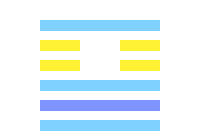
26.2.4.5 (26 > 13) - THE TÂ KHÛ HEXAGRAM.
- 2. The second line, undivided, shows a carriage with the strap under it removed.
- 4. The fourth line, divided, shows the young bull, (and yet) having the piece of wood over his horns. There will be great good fortune.
- 5. The fifth line, divided, shows the teeth of a castrated hog. There will be good fortune.
26.2.4.5 (26 > 13) - Not letting anything come out
One does not elaborate on the content of what one has learned with others.
Bing DeepL Google Yandex26.2.4.5 (26 > 13) - Not letting anything come out
One does not elaborate on the content of what one has learned with others.
Bing DeepL Google Yandex26.2.4.5 (26 > 13) - Tá tchu, le pouvoir contraignant de la grandeur
Tá tchu : 1. Grand entretien ; 2. Dompter, conduire
- 2. (Comme, par exemple, quand) un char a perdu le cuir qui le maintient en place (droit).
- 4. Le joug, la planchette que porte le jeune boeuf est d’un usage très heureux pour le dompter et le former au labourage (second sens).
- 5. Lorsqu’un sanglier est châtré, dompté, ses défenses sont exemptes de danger (et sont plutôt un instrument utile). — Arracher les dents à un sanglier, c’est priver un méchant des moyens de nuire.
26.2.4.5 (26 > 13) - Ne rien laisser transpirer
On ne s'étend pas pas sur le contenu de ce qu'on a appris avec les autres.
Bing DeepL Google Yandex26.2.4.5 (26 > 13) - Ellenőrzés
- 2. Otthagyja mert nem bíznak benne.
- 4. A másik erőszakosságának kezelése adakozással.
- 5. Vár amíg a legfiatalabb visszatér javítani.

26.1.2.4.5 (26 > 33) - THE TÂ KHÛ HEXAGRAM.
- 1. The first line, undivided, shows its subject in a position of peril. It will be advantageous for him to stop his advance.
- 2. The second line, undivided, shows a carriage with the strap under it removed.
- 4. The fourth line, divided, shows the young bull, (and yet) having the piece of wood over his horns. There will be great good fortune.
- 5. The fifth line, divided, shows the teeth of a castrated hog. There will be good fortune.
26.1.2.4.5 (26 > 33) - Hiding the loot
One spies on their relatives to find out where they have hidden what one has been looking for for a very long time.
Bing DeepL Google Yandex26.1.2.4.5 (26 > 33) - Hiding the loot
One spies on their relatives to find out where they have hidden what one has been looking for for a very long time.
Bing DeepL Google Yandex26.1.2.4.5 (26 > 33) - Tá tchu, le pouvoir contraignant de la grandeur
Tá tchu : 1. Grand entretien ; 2. Dompter, conduire
- 1. Quand il survient quelque danger, il est bon de s’arrêter (se vaincre), de céder aux circonstances et de ne point vouloir l’emporter de force.
- 2. (Comme, par exemple, quand) un char a perdu le cuir qui le maintient en place (droit).
- 4. Le joug, la planchette que porte le jeune boeuf est d’un usage très heureux pour le dompter et le former au labourage (second sens).
- 5. Lorsqu’un sanglier est châtré, dompté, ses défenses sont exemptes de danger (et sont plutôt un instrument utile). — Arracher les dents à un sanglier, c’est priver un méchant des moyens de nuire.
26.1.2.4.5 (26 > 33) - Planquer le magot
On épie ses proches pour savoir où ils ont caché ce qu'on cherche depuis très longtemps.
Bing DeepL Google Yandex26.1.2.4.5 (26 > 33) - Ellenőrzés
- 1. Nem akar menni és azonnal megnézni mert nem olyan fontos.
- 2. Otthagyja mert nem bíznak benne.
- 4. A másik erőszakosságának kezelése adakozással.
- 5. Vár amíg a legfiatalabb visszatér javítani.

26.2.3.4.5 (26 > 25) - THE TÂ KHÛ HEXAGRAM.
- 2. The second line, undivided, shows a carriage with the strap under it removed.
- 3. The third line, undivided, shows its subject urging his way with good horses. It will be advantageous for him to realise the difficulty (of his course), and to be firm and correct, exercising himself daily in his charioteering and methods of defence; then there will be advantage in whatever direction he may advance.
- 4. The fourth line, divided, shows the young bull, (and yet) having the piece of wood over his horns. There will be great good fortune.
- 5. The fifth line, divided, shows the teeth of a castrated hog. There will be good fortune.
26.2.3.4.5 (26 > 25) - Seducing with finesse
One is charmed by courteous gestures.
Bing DeepL Google Yandex26.2.3.4.5 (26 > 25) - Seducing with finesse
One is charmed by courteous gestures.
Bing DeepL Google Yandex26.2.3.4.5 (26 > 25) - Tá tchu, le pouvoir contraignant de la grandeur
Tá tchu : 1. Grand entretien ; 2. Dompter, conduire
- 2. (Comme, par exemple, quand) un char a perdu le cuir qui le maintient en place (droit).
- 3. Celui qui chemine avec des chevaux bien entretenus, sortira heureusement des difficultés. S’il s’exerce chaque jour à conduire et combattre, tout réussira pour lui. (Suite de la bonne éducation.)
- 4. Le joug, la planchette que porte le jeune boeuf est d’un usage très heureux pour le dompter et le former au labourage (second sens).
- 5. Lorsqu’un sanglier est châtré, dompté, ses défenses sont exemptes de danger (et sont plutôt un instrument utile). — Arracher les dents à un sanglier, c’est priver un méchant des moyens de nuire.
26.2.3.4.5 (26 > 25) - Séduire avec la manière
On est conquis par des gestes courtois.
Bing DeepL Google Yandex26.2.3.4.5 (26 > 25) - Ellenőrzés
- 2. Otthagyja mert nem bíznak benne.
- 3. Elkíséri.
- 4. A másik erőszakosságának kezelése adakozással.
- 5. Vár amíg a legfiatalabb visszatér javítani.

26.1.2.3.4.5 (26 > 12) - THE TÂ KHÛ HEXAGRAM.
- 1. The first line, undivided, shows its subject in a position of peril. It will be advantageous for him to stop his advance.
- 2. The second line, undivided, shows a carriage with the strap under it removed.
- 3. The third line, undivided, shows its subject urging his way with good horses. It will be advantageous for him to realise the difficulty (of his course), and to be firm and correct, exercising himself daily in his charioteering and methods of defence; then there will be advantage in whatever direction he may advance.
- 4. The fourth line, divided, shows the young bull, (and yet) having the piece of wood over his horns. There will be great good fortune.
- 5. The fifth line, divided, shows the teeth of a castrated hog. There will be good fortune.
26.1.2.3.4.5 (26 > 12) - Being afraid of the mess
One shuddered, discovering the disorder that others have left behind.
Bing DeepL Google Yandex26.1.2.3.4.5 (26 > 12) - Being afraid of the mess
One shuddered, discovering the disorder that others have left behind.
Bing DeepL Google Yandex26.1.2.3.4.5 (26 > 12) - Tá tchu, le pouvoir contraignant de la grandeur
Tá tchu : 1. Grand entretien ; 2. Dompter, conduire
- 1. Quand il survient quelque danger, il est bon de s’arrêter (se vaincre), de céder aux circonstances et de ne point vouloir l’emporter de force.
- 2. (Comme, par exemple, quand) un char a perdu le cuir qui le maintient en place (droit).
- 3. Celui qui chemine avec des chevaux bien entretenus, sortira heureusement des difficultés. S’il s’exerce chaque jour à conduire et combattre, tout réussira pour lui. (Suite de la bonne éducation.)
- 4. Le joug, la planchette que porte le jeune boeuf est d’un usage très heureux pour le dompter et le former au labourage (second sens).
- 5. Lorsqu’un sanglier est châtré, dompté, ses défenses sont exemptes de danger (et sont plutôt un instrument utile). — Arracher les dents à un sanglier, c’est priver un méchant des moyens de nuire.
26.1.2.3.4.5 (26 > 12) - Avoir peur du bazar
On a frémi à la découverte du désordre que les autres ont laissé.
Bing DeepL Google Yandex26.1.2.3.4.5 (26 > 12) - Ellenőrzés
- 1. Nem akar menni és azonnal megnézni mert nem olyan fontos.
- 2. Otthagyja mert nem bíznak benne.
- 3. Elkíséri.
- 4. A másik erőszakosságának kezelése adakozással.
- 5. Vár amíg a legfiatalabb visszatér javítani.
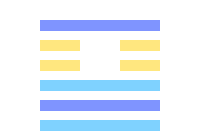
26.2.6 (26 > 36) - THE TÂ KHÛ HEXAGRAM.
- 2. The second line, undivided, shows a carriage with the strap under it removed.
- 6. The sixth line, undivided, shows its subject (as) in command of the firmament of heaven. There will be progress.
26.2.6 (26 > 36) - Restoring the truth
One approves without reservation a measure designed to restore order.
Bing DeepL Google Yandex26.2.6 (26 > 36) - Restoring the truth
One approves without reservation a measure designed to restore order.
Bing DeepL Google Yandex26.2.6 (26 > 36) - Tá tchu, le pouvoir contraignant de la grandeur
Tá tchu : 1. Grand entretien ; 2. Dompter, conduire
- 2. (Comme, par exemple, quand) un char a perdu le cuir qui le maintient en place (droit).
-
6. Combien la voie du ciel est étendue ! Qu’elle est immense à parcourir !
Allusion à la forme de l’hexagramme qui représente une montagne au-dessus du ciel. Se rapporte à l’expression tchu kih.
26.2.6 (26 > 36) - Restaurer la vérité
On approuve sans la moindre réserve une mesure destinée à rétablir l'ordre.
Bing DeepL Google Yandex26.2.6 (26 > 36) - Ellenőrzés
- 2. Otthagyja mert nem bíznak benne.
- 6. Kérik hogy javítsa meg.

26.1.2.6 (26 > 15) - THE TÂ KHÛ HEXAGRAM.
- 1. The first line, undivided, shows its subject in a position of peril. It will be advantageous for him to stop his advance.
- 2. The second line, undivided, shows a carriage with the strap under it removed.
- 6. The sixth line, undivided, shows its subject (as) in command of the firmament of heaven. There will be progress.
26.1.2.6 (26 > 15) - Answering one last time
One recovers their poise the time to fight their last battle.
Bing DeepL Google Yandex26.1.2.6 (26 > 15) - Answering one last time
One recovers their poise the time to fight their last battle.
Bing DeepL Google Yandex26.1.2.6 (26 > 15) - Tá tchu, le pouvoir contraignant de la grandeur
Tá tchu : 1. Grand entretien ; 2. Dompter, conduire
- 1. Quand il survient quelque danger, il est bon de s’arrêter (se vaincre), de céder aux circonstances et de ne point vouloir l’emporter de force.
- 2. (Comme, par exemple, quand) un char a perdu le cuir qui le maintient en place (droit).
-
6. Combien la voie du ciel est étendue ! Qu’elle est immense à parcourir !
Allusion à la forme de l’hexagramme qui représente une montagne au-dessus du ciel. Se rapporte à l’expression tchu kih.
26.1.2.6 (26 > 15) - Répondre une dernière fois
On retrouve son assurance le temps de livrer un dernier combat.
Bing DeepL Google Yandex26.1.2.6 (26 > 15) - Ellenőrzés
- 1. Nem akar menni és azonnal megnézni mert nem olyan fontos.
- 2. Otthagyja mert nem bíznak benne.
- 6. Kérik hogy javítsa meg.

26.2.3.6 (26 > 24) - THE TÂ KHÛ HEXAGRAM.
- 2. The second line, undivided, shows a carriage with the strap under it removed.
- 3. The third line, undivided, shows its subject urging his way with good horses. It will be advantageous for him to realise the difficulty (of his course), and to be firm and correct, exercising himself daily in his charioteering and methods of defence; then there will be advantage in whatever direction he may advance.
- 6. The sixth line, undivided, shows its subject (as) in command of the firmament of heaven. There will be progress.
26.2.3.6 (26 > 24) - Leaving everything
One packs up under the effect of sudden disillusionment.
Bing DeepL Google Yandex26.2.3.6 (26 > 24) - Leaving everything
One packs up under the effect of sudden disillusionment.
Bing DeepL Google Yandex26.2.3.6 (26 > 24) - Tá tchu, le pouvoir contraignant de la grandeur
Tá tchu : 1. Grand entretien ; 2. Dompter, conduire
- 2. (Comme, par exemple, quand) un char a perdu le cuir qui le maintient en place (droit).
- 3. Celui qui chemine avec des chevaux bien entretenus, sortira heureusement des difficultés. S’il s’exerce chaque jour à conduire et combattre, tout réussira pour lui. (Suite de la bonne éducation.)
-
6. Combien la voie du ciel est étendue ! Qu’elle est immense à parcourir !
Allusion à la forme de l’hexagramme qui représente une montagne au-dessus du ciel. Se rapporte à l’expression tchu kih.
26.2.3.6 (26 > 24) - Tout quitter
On plie bagages sous l'effet d'une soudaine désillusion.
Bing DeepL Google Yandex26.2.3.6 (26 > 24) - Ellenőrzés
- 2. Otthagyja mert nem bíznak benne.
- 3. Elkíséri.
- 6. Kérik hogy javítsa meg.

26.1.2.3.6 (26 > 2) - THE TÂ KHÛ HEXAGRAM.
- 1. The first line, undivided, shows its subject in a position of peril. It will be advantageous for him to stop his advance.
- 2. The second line, undivided, shows a carriage with the strap under it removed.
- 3. The third line, undivided, shows its subject urging his way with good horses. It will be advantageous for him to realise the difficulty (of his course), and to be firm and correct, exercising himself daily in his charioteering and methods of defence; then there will be advantage in whatever direction he may advance.
- 6. The sixth line, undivided, shows its subject (as) in command of the firmament of heaven. There will be progress.
26.1.2.3.6 (26 > 2) - Pouring oil on troubled waters
One is going to fail if one shows aggressiveness.
Bing DeepL Google Yandex26.1.2.3.6 (26 > 2) - Pouring oil on troubled waters
One is going to fail if one shows aggressiveness.
Bing DeepL Google Yandex26.1.2.3.6 (26 > 2) - Tá tchu, le pouvoir contraignant de la grandeur
Tá tchu : 1. Grand entretien ; 2. Dompter, conduire
- 1. Quand il survient quelque danger, il est bon de s’arrêter (se vaincre), de céder aux circonstances et de ne point vouloir l’emporter de force.
- 2. (Comme, par exemple, quand) un char a perdu le cuir qui le maintient en place (droit).
- 3. Celui qui chemine avec des chevaux bien entretenus, sortira heureusement des difficultés. S’il s’exerce chaque jour à conduire et combattre, tout réussira pour lui. (Suite de la bonne éducation.)
-
6. Combien la voie du ciel est étendue ! Qu’elle est immense à parcourir !
Allusion à la forme de l’hexagramme qui représente une montagne au-dessus du ciel. Se rapporte à l’expression tchu kih.
26.1.2.3.6 (26 > 2) - Calmer le jeu
On va échouer si on se montre agressif.
Bing DeepL Google Yandex26.1.2.3.6 (26 > 2) - Ellenőrzés
- 1. Nem akar menni és azonnal megnézni mert nem olyan fontos.
- 2. Otthagyja mert nem bíznak benne.
- 3. Elkíséri.
- 6. Kérik hogy javítsa meg.
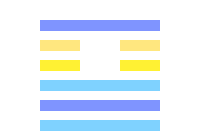
26.2.4.6 (26 > 55) - THE TÂ KHÛ HEXAGRAM.
- 2. The second line, undivided, shows a carriage with the strap under it removed.
- 4. The fourth line, divided, shows the young bull, (and yet) having the piece of wood over his horns. There will be great good fortune.
- 6. The sixth line, undivided, shows its subject (as) in command of the firmament of heaven. There will be progress.
26.2.4.6 (26 > 55) - Having to deal with an unprecedented crisis
Even the most cynical had not foreseen such calamities.
Bing DeepL Google Yandex26.2.4.6 (26 > 55) - Having to deal with an unprecedented crisis
Even the most cynical had not foreseen such calamities.
Bing DeepL Google Yandex26.2.4.6 (26 > 55) - Tá tchu, le pouvoir contraignant de la grandeur
Tá tchu : 1. Grand entretien ; 2. Dompter, conduire
- 2. (Comme, par exemple, quand) un char a perdu le cuir qui le maintient en place (droit).
- 4. Le joug, la planchette que porte le jeune boeuf est d’un usage très heureux pour le dompter et le former au labourage (second sens).
-
6. Combien la voie du ciel est étendue ! Qu’elle est immense à parcourir !
Allusion à la forme de l’hexagramme qui représente une montagne au-dessus du ciel. Se rapporte à l’expression tchu kih.
26.2.4.6 (26 > 55) - Avoir à gérer une crise sans précédent
Même les plus cyniques n'avaient pas prévu de telles calamités.
Bing DeepL Google Yandex26.2.4.6 (26 > 55) - Ellenőrzés
- 2. Otthagyja mert nem bíznak benne.
- 4. A másik erőszakosságának kezelése adakozással.
- 6. Kérik hogy javítsa meg.

26.1.2.4.6 (26 > 62) - THE TÂ KHÛ HEXAGRAM.
- 1. The first line, undivided, shows its subject in a position of peril. It will be advantageous for him to stop his advance.
- 2. The second line, undivided, shows a carriage with the strap under it removed.
- 4. The fourth line, divided, shows the young bull, (and yet) having the piece of wood over his horns. There will be great good fortune.
- 6. The sixth line, undivided, shows its subject (as) in command of the firmament of heaven. There will be progress.
26.1.2.4.6 (26 > 62) - Jumping through hoops
One goes through hardships that others have knowingly placed in the way.
Bing DeepL Google Yandex26.1.2.4.6 (26 > 62) - Jumping through hoops
One goes through hardships that others have knowingly placed in the way.
Bing DeepL Google Yandex26.1.2.4.6 (26 > 62) - Tá tchu, le pouvoir contraignant de la grandeur
Tá tchu : 1. Grand entretien ; 2. Dompter, conduire
- 1. Quand il survient quelque danger, il est bon de s’arrêter (se vaincre), de céder aux circonstances et de ne point vouloir l’emporter de force.
- 2. (Comme, par exemple, quand) un char a perdu le cuir qui le maintient en place (droit).
- 4. Le joug, la planchette que porte le jeune boeuf est d’un usage très heureux pour le dompter et le former au labourage (second sens).
-
6. Combien la voie du ciel est étendue ! Qu’elle est immense à parcourir !
Allusion à la forme de l’hexagramme qui représente une montagne au-dessus du ciel. Se rapporte à l’expression tchu kih.
26.1.2.4.6 (26 > 62) - Franchir un parcours d'obstacles
On traverse des épreuves que les autres ont placé sciemment en travers de la route.
Bing DeepL Google Yandex26.1.2.4.6 (26 > 62) - Ellenőrzés
- 1. Nem akar menni és azonnal megnézni mert nem olyan fontos.
- 2. Otthagyja mert nem bíznak benne.
- 4. A másik erőszakosságának kezelése adakozással.
- 6. Kérik hogy javítsa meg.

26.2.3.4.6 (26 > 51) - THE TÂ KHÛ HEXAGRAM.
- 2. The second line, undivided, shows a carriage with the strap under it removed.
- 3. The third line, undivided, shows its subject urging his way with good horses. It will be advantageous for him to realise the difficulty (of his course), and to be firm and correct, exercising himself daily in his charioteering and methods of defence; then there will be advantage in whatever direction he may advance.
- 4. The fourth line, divided, shows the young bull, (and yet) having the piece of wood over his horns. There will be great good fortune.
- 6. The sixth line, undivided, shows its subject (as) in command of the firmament of heaven. There will be progress.
26.2.3.4.6 (26 > 51) - Thinking wisely
One is not doing well when one makes decisions that one abandons immediately afterwards.
Bing DeepL Google Yandex26.2.3.4.6 (26 > 51) - Thinking wisely
One is not doing well when one makes decisions that one abandons immediately afterwards.
Bing DeepL Google Yandex26.2.3.4.6 (26 > 51) - Tá tchu, le pouvoir contraignant de la grandeur
Tá tchu : 1. Grand entretien ; 2. Dompter, conduire
- 2. (Comme, par exemple, quand) un char a perdu le cuir qui le maintient en place (droit).
- 3. Celui qui chemine avec des chevaux bien entretenus, sortira heureusement des difficultés. S’il s’exerce chaque jour à conduire et combattre, tout réussira pour lui. (Suite de la bonne éducation.)
- 4. Le joug, la planchette que porte le jeune boeuf est d’un usage très heureux pour le dompter et le former au labourage (second sens).
-
6. Combien la voie du ciel est étendue ! Qu’elle est immense à parcourir !
Allusion à la forme de l’hexagramme qui représente une montagne au-dessus du ciel. Se rapporte à l’expression tchu kih.
26.2.3.4.6 (26 > 51) - Avoir de la suite dans les idées
On ne tourne pas rond quand on prend des décisions que l'on abandonne tout de suite après.
Bing DeepL Google Yandex26.2.3.4.6 (26 > 51) - Ellenőrzés
- 2. Otthagyja mert nem bíznak benne.
- 3. Elkíséri.
- 4. A másik erőszakosságának kezelése adakozással.
- 6. Kérik hogy javítsa meg.

26.1.2.3.4.6 (26 > 16) - THE TÂ KHÛ HEXAGRAM.
- 1. The first line, undivided, shows its subject in a position of peril. It will be advantageous for him to stop his advance.
- 2. The second line, undivided, shows a carriage with the strap under it removed.
- 3. The third line, undivided, shows its subject urging his way with good horses. It will be advantageous for him to realise the difficulty (of his course), and to be firm and correct, exercising himself daily in his charioteering and methods of defence; then there will be advantage in whatever direction he may advance.
- 4. The fourth line, divided, shows the young bull, (and yet) having the piece of wood over his horns. There will be great good fortune.
- 6. The sixth line, undivided, shows its subject (as) in command of the firmament of heaven. There will be progress.
26.1.2.3.4.6 (26 > 16) - Paving the way for research
One sharpens one's hypothesis by calling for new studies.
Bing DeepL Google Yandex26.1.2.3.4.6 (26 > 16) - Paving the way for research
One sharpens one's hypothesis by calling for new studies.
Bing DeepL Google Yandex26.1.2.3.4.6 (26 > 16) - Tá tchu, le pouvoir contraignant de la grandeur
Tá tchu : 1. Grand entretien ; 2. Dompter, conduire
- 1. Quand il survient quelque danger, il est bon de s’arrêter (se vaincre), de céder aux circonstances et de ne point vouloir l’emporter de force.
- 2. (Comme, par exemple, quand) un char a perdu le cuir qui le maintient en place (droit).
- 3. Celui qui chemine avec des chevaux bien entretenus, sortira heureusement des difficultés. S’il s’exerce chaque jour à conduire et combattre, tout réussira pour lui. (Suite de la bonne éducation.)
- 4. Le joug, la planchette que porte le jeune boeuf est d’un usage très heureux pour le dompter et le former au labourage (second sens).
-
6. Combien la voie du ciel est étendue ! Qu’elle est immense à parcourir !
Allusion à la forme de l’hexagramme qui représente une montagne au-dessus du ciel. Se rapporte à l’expression tchu kih.
26.1.2.3.4.6 (26 > 16) - Ouvrir la voie à la recherche
On affute son hypothèse en réclamant de nouvelles études.
Bing DeepL Google Yandex26.1.2.3.4.6 (26 > 16) - Ellenőrzés
- 1. Nem akar menni és azonnal megnézni mert nem olyan fontos.
- 2. Otthagyja mert nem bíznak benne.
- 3. Elkíséri.
- 4. A másik erőszakosságának kezelése adakozással.
- 6. Kérik hogy javítsa meg.

26.2.5.6 (26 > 63) - THE TÂ KHÛ HEXAGRAM.
- 2. The second line, undivided, shows a carriage with the strap under it removed.
- 5. The fifth line, divided, shows the teeth of a castrated hog. There will be good fortune.
- 6. The sixth line, undivided, shows its subject (as) in command of the firmament of heaven. There will be progress.
26.2.5.6 (26 > 63) - Being in denial
One claims one's innocence without answering the accusations that have been made.
Bing DeepL Google Yandex26.2.5.6 (26 > 63) - Being in denial
One claims one's innocence without answering the accusations that have been made.
Bing DeepL Google Yandex26.2.5.6 (26 > 63) - Tá tchu, le pouvoir contraignant de la grandeur
Tá tchu : 1. Grand entretien ; 2. Dompter, conduire
- 2. (Comme, par exemple, quand) un char a perdu le cuir qui le maintient en place (droit).
- 5. Lorsqu’un sanglier est châtré, dompté, ses défenses sont exemptes de danger (et sont plutôt un instrument utile). — Arracher les dents à un sanglier, c’est priver un méchant des moyens de nuire.
-
6. Combien la voie du ciel est étendue ! Qu’elle est immense à parcourir !
Allusion à la forme de l’hexagramme qui représente une montagne au-dessus du ciel. Se rapporte à l’expression tchu kih.
26.2.5.6 (26 > 63) - Être dans le déni
On clame son innocence sans répondre aux accusations qui ont été formulées.
Bing DeepL Google Yandex26.2.5.6 (26 > 63) - Ellenőrzés
- 2. Otthagyja mert nem bíznak benne.
- 5. Vár amíg a legfiatalabb visszatér javítani.
- 6. Kérik hogy javítsa meg.

26.1.2.5.6 (26 > 39) - THE TÂ KHÛ HEXAGRAM.
- 1. The first line, undivided, shows its subject in a position of peril. It will be advantageous for him to stop his advance.
- 2. The second line, undivided, shows a carriage with the strap under it removed.
- 5. The fifth line, divided, shows the teeth of a castrated hog. There will be good fortune.
- 6. The sixth line, undivided, shows its subject (as) in command of the firmament of heaven. There will be progress.
26.1.2.5.6 (26 > 39) - Ensuring succession
One takes over from those who have fought all the time.
Bing DeepL Google Yandex26.1.2.5.6 (26 > 39) - Ensuring succession
One takes over from those who have fought all the time.
Bing DeepL Google Yandex26.1.2.5.6 (26 > 39) - Tá tchu, le pouvoir contraignant de la grandeur
Tá tchu : 1. Grand entretien ; 2. Dompter, conduire
- 1. Quand il survient quelque danger, il est bon de s’arrêter (se vaincre), de céder aux circonstances et de ne point vouloir l’emporter de force.
- 2. (Comme, par exemple, quand) un char a perdu le cuir qui le maintient en place (droit).
- 5. Lorsqu’un sanglier est châtré, dompté, ses défenses sont exemptes de danger (et sont plutôt un instrument utile). — Arracher les dents à un sanglier, c’est priver un méchant des moyens de nuire.
-
6. Combien la voie du ciel est étendue ! Qu’elle est immense à parcourir !
Allusion à la forme de l’hexagramme qui représente une montagne au-dessus du ciel. Se rapporte à l’expression tchu kih.
26.1.2.5.6 (26 > 39) - Assurer la relève
On prend le relai de ceux qui ont combattu sans arrêt.
Bing DeepL Google Yandex26.1.2.5.6 (26 > 39) - Ellenőrzés
- 1. Nem akar menni és azonnal megnézni mert nem olyan fontos.
- 2. Otthagyja mert nem bíznak benne.
- 5. Vár amíg a legfiatalabb visszatér javítani.
- 6. Kérik hogy javítsa meg.

26.2.3.5.6 (26 > 3) - THE TÂ KHÛ HEXAGRAM.
- 2. The second line, undivided, shows a carriage with the strap under it removed.
- 3. The third line, undivided, shows its subject urging his way with good horses. It will be advantageous for him to realise the difficulty (of his course), and to be firm and correct, exercising himself daily in his charioteering and methods of defence; then there will be advantage in whatever direction he may advance.
- 5. The fifth line, divided, shows the teeth of a castrated hog. There will be good fortune.
- 6. The sixth line, undivided, shows its subject (as) in command of the firmament of heaven. There will be progress.
26.2.3.5.6 (26 > 3) - Respecting differences
One may hurt others if one does not pay attention to their whims.
Bing DeepL Google Yandex26.2.3.5.6 (26 > 3) - Respecting differences
One may hurt others if one does not pay attention to their whims.
Bing DeepL Google Yandex26.2.3.5.6 (26 > 3) - Tá tchu, le pouvoir contraignant de la grandeur
Tá tchu : 1. Grand entretien ; 2. Dompter, conduire
- 2. (Comme, par exemple, quand) un char a perdu le cuir qui le maintient en place (droit).
- 3. Celui qui chemine avec des chevaux bien entretenus, sortira heureusement des difficultés. S’il s’exerce chaque jour à conduire et combattre, tout réussira pour lui. (Suite de la bonne éducation.)
- 5. Lorsqu’un sanglier est châtré, dompté, ses défenses sont exemptes de danger (et sont plutôt un instrument utile). — Arracher les dents à un sanglier, c’est priver un méchant des moyens de nuire.
-
6. Combien la voie du ciel est étendue ! Qu’elle est immense à parcourir !
Allusion à la forme de l’hexagramme qui représente une montagne au-dessus du ciel. Se rapporte à l’expression tchu kih.
26.2.3.5.6 (26 > 3) - Respecter les différences
On peut blesser les autres si l'on ne fait pas attention à leurs caprices.
Bing DeepL Google Yandex26.2.3.5.6 (26 > 3) - Ellenőrzés
- 2. Otthagyja mert nem bíznak benne.
- 3. Elkíséri.
- 5. Vár amíg a legfiatalabb visszatér javítani.
- 6. Kérik hogy javítsa meg.

26.1.2.3.5.6 (26 > 8) - THE TÂ KHÛ HEXAGRAM.
- 1. The first line, undivided, shows its subject in a position of peril. It will be advantageous for him to stop his advance.
- 2. The second line, undivided, shows a carriage with the strap under it removed.
- 3. The third line, undivided, shows its subject urging his way with good horses. It will be advantageous for him to realise the difficulty (of his course), and to be firm and correct, exercising himself daily in his charioteering and methods of defence; then there will be advantage in whatever direction he may advance.
- 5. The fifth line, divided, shows the teeth of a castrated hog. There will be good fortune.
- 6. The sixth line, undivided, shows its subject (as) in command of the firmament of heaven. There will be progress.
26.1.2.3.5.6 (26 > 8) - Rising to overcome obstacles
One has climbed the steps that lead to the success of one's projects.
Bing DeepL Google Yandex26.1.2.3.5.6 (26 > 8) - Rising to overcome obstacles
One has climbed the steps that lead to the success of one's projects.
Bing DeepL Google Yandex26.1.2.3.5.6 (26 > 8) - Tá tchu, le pouvoir contraignant de la grandeur
Tá tchu : 1. Grand entretien ; 2. Dompter, conduire
- 1. Quand il survient quelque danger, il est bon de s’arrêter (se vaincre), de céder aux circonstances et de ne point vouloir l’emporter de force.
- 2. (Comme, par exemple, quand) un char a perdu le cuir qui le maintient en place (droit).
- 3. Celui qui chemine avec des chevaux bien entretenus, sortira heureusement des difficultés. S’il s’exerce chaque jour à conduire et combattre, tout réussira pour lui. (Suite de la bonne éducation.)
- 5. Lorsqu’un sanglier est châtré, dompté, ses défenses sont exemptes de danger (et sont plutôt un instrument utile). — Arracher les dents à un sanglier, c’est priver un méchant des moyens de nuire.
-
6. Combien la voie du ciel est étendue ! Qu’elle est immense à parcourir !
Allusion à la forme de l’hexagramme qui représente une montagne au-dessus du ciel. Se rapporte à l’expression tchu kih.
26.1.2.3.5.6 (26 > 8) - S'élever pour franchir les obstacles
On a gravi les marches qui mènent à la réussite de ses projets.
Bing DeepL Google Yandex26.1.2.3.5.6 (26 > 8) - Ellenőrzés
- 1. Nem akar menni és azonnal megnézni mert nem olyan fontos.
- 2. Otthagyja mert nem bíznak benne.
- 3. Elkíséri.
- 5. Vár amíg a legfiatalabb visszatér javítani.
- 6. Kérik hogy javítsa meg.
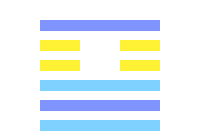
26.2.4.5.6 (26 > 49) - THE TÂ KHÛ HEXAGRAM.
- 2. The second line, undivided, shows a carriage with the strap under it removed.
- 4. The fourth line, divided, shows the young bull, (and yet) having the piece of wood over his horns. There will be great good fortune.
- 5. The fifth line, divided, shows the teeth of a castrated hog. There will be good fortune.
- 6. The sixth line, undivided, shows its subject (as) in command of the firmament of heaven. There will be progress.
26.2.4.5.6 (26 > 49) - Needing to be comforted
One rushes when the others call because one is overwhelmed with worry.
Bing DeepL Google Yandex26.2.4.5.6 (26 > 49) - Needing to be comforted
One rushes when the others call because one is overwhelmed with worry.
Bing DeepL Google Yandex26.2.4.5.6 (26 > 49) - Tá tchu, le pouvoir contraignant de la grandeur
Tá tchu : 1. Grand entretien ; 2. Dompter, conduire
- 2. (Comme, par exemple, quand) un char a perdu le cuir qui le maintient en place (droit).
- 4. Le joug, la planchette que porte le jeune boeuf est d’un usage très heureux pour le dompter et le former au labourage (second sens).
- 5. Lorsqu’un sanglier est châtré, dompté, ses défenses sont exemptes de danger (et sont plutôt un instrument utile). — Arracher les dents à un sanglier, c’est priver un méchant des moyens de nuire.
-
6. Combien la voie du ciel est étendue ! Qu’elle est immense à parcourir !
Allusion à la forme de l’hexagramme qui représente une montagne au-dessus du ciel. Se rapporte à l’expression tchu kih.
26.2.4.5.6 (26 > 49) - Avoir besoin de réconfort
On accourt quand les autres appellent car on déborde d'inquiétude.
Bing DeepL Google Yandex26.2.4.5.6 (26 > 49) - Ellenőrzés
- 2. Otthagyja mert nem bíznak benne.
- 4. A másik erőszakosságának kezelése adakozással.
- 5. Vár amíg a legfiatalabb visszatér javítani.
- 6. Kérik hogy javítsa meg.

26.1.2.4.5.6 (26 > 31) - THE TÂ KHÛ HEXAGRAM.
- 1. The first line, undivided, shows its subject in a position of peril. It will be advantageous for him to stop his advance.
- 2. The second line, undivided, shows a carriage with the strap under it removed.
- 4. The fourth line, divided, shows the young bull, (and yet) having the piece of wood over his horns. There will be great good fortune.
- 5. The fifth line, divided, shows the teeth of a castrated hog. There will be good fortune.
- 6. The sixth line, undivided, shows its subject (as) in command of the firmament of heaven. There will be progress.
26.1.2.4.5.6 (26 > 31) - Getting a head start
One hopes to be able to declare one's flame before the others.
Bing DeepL Google Yandex26.1.2.4.5.6 (26 > 31) - Getting a head start
One hopes to be able to declare one's flame before the others.
Bing DeepL Google Yandex26.1.2.4.5.6 (26 > 31) - Tá tchu, le pouvoir contraignant de la grandeur
Tá tchu : 1. Grand entretien ; 2. Dompter, conduire
- 1. Quand il survient quelque danger, il est bon de s’arrêter (se vaincre), de céder aux circonstances et de ne point vouloir l’emporter de force.
- 2. (Comme, par exemple, quand) un char a perdu le cuir qui le maintient en place (droit).
- 4. Le joug, la planchette que porte le jeune boeuf est d’un usage très heureux pour le dompter et le former au labourage (second sens).
- 5. Lorsqu’un sanglier est châtré, dompté, ses défenses sont exemptes de danger (et sont plutôt un instrument utile). — Arracher les dents à un sanglier, c’est priver un méchant des moyens de nuire.
-
6. Combien la voie du ciel est étendue ! Qu’elle est immense à parcourir !
Allusion à la forme de l’hexagramme qui représente une montagne au-dessus du ciel. Se rapporte à l’expression tchu kih.
26.1.2.4.5.6 (26 > 31) - Prendre de vitesse
On espère pouvoir déclarer sa flamme avant les autres.
Bing DeepL Google Yandex26.1.2.4.5.6 (26 > 31) - Ellenőrzés
- 1. Nem akar menni és azonnal megnézni mert nem olyan fontos.
- 2. Otthagyja mert nem bíznak benne.
- 4. A másik erőszakosságának kezelése adakozással.
- 5. Vár amíg a legfiatalabb visszatér javítani.
- 6. Kérik hogy javítsa meg.

26.2.3.4.5.6 (26 > 17) - THE TÂ KHÛ HEXAGRAM.
- 2. The second line, undivided, shows a carriage with the strap under it removed.
- 3. The third line, undivided, shows its subject urging his way with good horses. It will be advantageous for him to realise the difficulty (of his course), and to be firm and correct, exercising himself daily in his charioteering and methods of defence; then there will be advantage in whatever direction he may advance.
- 4. The fourth line, divided, shows the young bull, (and yet) having the piece of wood over his horns. There will be great good fortune.
- 5. The fifth line, divided, shows the teeth of a castrated hog. There will be good fortune.
- 6. The sixth line, undivided, shows its subject (as) in command of the firmament of heaven. There will be progress.
26.2.3.4.5.6 (26 > 17) - Self-censorship
One learns to pay attention to the ideas one develops when they may offend the sensibilities of younger people.
Bing DeepL Google Yandex26.2.3.4.5.6 (26 > 17) - Self-censorship
One learns to pay attention to the ideas one develops when they may offend the sensibilities of younger people.
Bing DeepL Google Yandex26.2.3.4.5.6 (26 > 17) - Tá tchu, le pouvoir contraignant de la grandeur
Tá tchu : 1. Grand entretien ; 2. Dompter, conduire
- 2. (Comme, par exemple, quand) un char a perdu le cuir qui le maintient en place (droit).
- 3. Celui qui chemine avec des chevaux bien entretenus, sortira heureusement des difficultés. S’il s’exerce chaque jour à conduire et combattre, tout réussira pour lui. (Suite de la bonne éducation.)
- 4. Le joug, la planchette que porte le jeune boeuf est d’un usage très heureux pour le dompter et le former au labourage (second sens).
- 5. Lorsqu’un sanglier est châtré, dompté, ses défenses sont exemptes de danger (et sont plutôt un instrument utile). — Arracher les dents à un sanglier, c’est priver un méchant des moyens de nuire.
-
6. Combien la voie du ciel est étendue ! Qu’elle est immense à parcourir !
Allusion à la forme de l’hexagramme qui représente une montagne au-dessus du ciel. Se rapporte à l’expression tchu kih.
26.2.3.4.5.6 (26 > 17) - S'auto-censurer
On apprend à faire attention aux idées que l'on développe quand elles peuvent heurter la sensibilité des plus jeunes.
Bing DeepL Google Yandex26.2.3.4.5.6 (26 > 17) - Ellenőrzés
- 2. Otthagyja mert nem bíznak benne.
- 3. Elkíséri.
- 4. A másik erőszakosságának kezelése adakozással.
- 5. Vár amíg a legfiatalabb visszatér javítani.
- 6. Kérik hogy javítsa meg.
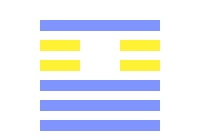
26.1.2.3.4.5.6 (26 > 45) - THE TÂ KHÛ HEXAGRAM.
- 1. The first line, undivided, shows its subject in a position of peril. It will be advantageous for him to stop his advance.
- 2. The second line, undivided, shows a carriage with the strap under it removed.
- 3. The third line, undivided, shows its subject urging his way with good horses. It will be advantageous for him to realise the difficulty (of his course), and to be firm and correct, exercising himself daily in his charioteering and methods of defence; then there will be advantage in whatever direction he may advance.
- 4. The fourth line, divided, shows the young bull, (and yet) having the piece of wood over his horns. There will be great good fortune.
- 5. The fifth line, divided, shows the teeth of a castrated hog. There will be good fortune.
- 6. The sixth line, undivided, shows its subject (as) in command of the firmament of heaven. There will be progress.
26.1.2.3.4.5.6 (26 > 45) - Losing all one's strength
One surrenders before the enemy because the troops did not survive after the assault.
Bing DeepL Google Yandex26.1.2.3.4.5.6 (26 > 45) - Losing all one's strength
One surrenders before the enemy because the troops did not survive after the assault.
Bing DeepL Google Yandex26.1.2.3.4.5.6 (26 > 45) - Tá tchu, le pouvoir contraignant de la grandeur
Tá tchu : 1. Grand entretien ; 2. Dompter, conduire
- 1. Quand il survient quelque danger, il est bon de s’arrêter (se vaincre), de céder aux circonstances et de ne point vouloir l’emporter de force.
- 2. (Comme, par exemple, quand) un char a perdu le cuir qui le maintient en place (droit).
- 3. Celui qui chemine avec des chevaux bien entretenus, sortira heureusement des difficultés. S’il s’exerce chaque jour à conduire et combattre, tout réussira pour lui. (Suite de la bonne éducation.)
- 4. Le joug, la planchette que porte le jeune boeuf est d’un usage très heureux pour le dompter et le former au labourage (second sens).
- 5. Lorsqu’un sanglier est châtré, dompté, ses défenses sont exemptes de danger (et sont plutôt un instrument utile). — Arracher les dents à un sanglier, c’est priver un méchant des moyens de nuire.
-
6. Combien la voie du ciel est étendue ! Qu’elle est immense à parcourir !
Allusion à la forme de l’hexagramme qui représente une montagne au-dessus du ciel. Se rapporte à l’expression tchu kih.
26.1.2.3.4.5.6 (26 > 45) - Perdre toutes ses forces
On capitule devant l'ennemi car les troupes n'ont pas survécu après l'assaut.
Bing DeepL Google Yandex26.1.2.3.4.5.6 (26 > 45) - Ellenőrzés
- 1. Nem akar menni és azonnal megnézni mert nem olyan fontos.
- 2. Otthagyja mert nem bíznak benne.
- 3. Elkíséri.
- 4. A másik erőszakosságának kezelése adakozással.
- 5. Vár amíg a legfiatalabb visszatér javítani.
- 6. Kérik hogy javítsa meg.

